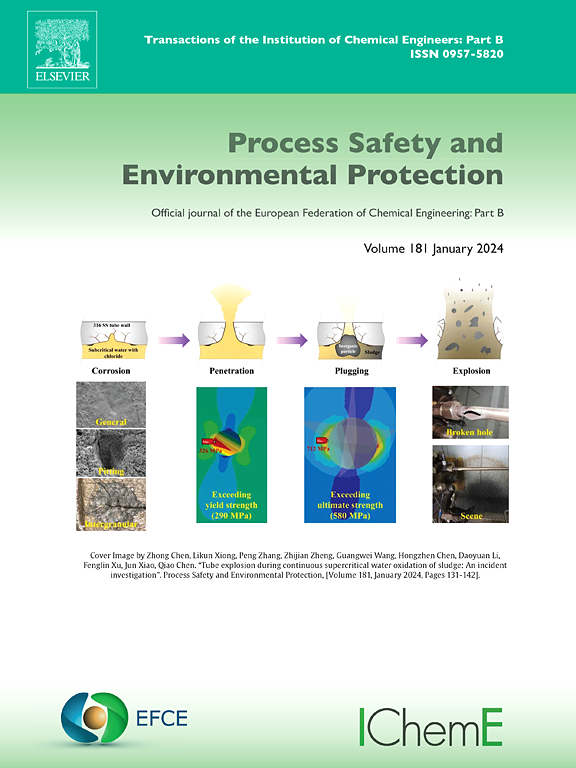通过热解和加氢处理将塑料废弃物催化转化为柴油燃料
IF 6.9
2区 环境科学与生态学
Q1 ENGINEERING, CHEMICAL
引用次数: 0
摘要
本研究评估了经水力处理的塑料热解油(HPO)作为从混合塑料废弃物中提取的可持续替代燃料的潜力。根据 IS 标准对柴油、混合塑料热解油 (MPPO) 和 HPO 的理化特性进行了全面分析,从而将 HPO 的特性与 EN590 柴油标准进行了直接比较和比对。气相色谱-质谱(GC-MS)分析确定了主要的燃料成分-烷烃、烯烃、苯和萘,其中 HPO 与商用柴油的成分相似度高达 98%。HPO 与不同比例纯柴油的混合比例为(30:70、60:40 和 90:10)。加氢处理技术有效地降低了 MPPO 中的烯烃含量,提高了所得 HPO 的纯度和质量。这种精炼对确保油品符合必要的燃料标准至关重要。发动机性能评估进一步表明,将 HPO 与传统柴油混合后,其排放物与标准柴油的排放物相似度高达 95%。这种接近的排放特性凸显了 HPO 作为一种更清洁、更环保的燃料替代品的潜力。此外,由于加氢处理,HPO 中的芳烃含量增加,大大改善了燃烧性能。这一改进不仅支持了用 HPO 替代传统柴油的可行性,而且还表明 HPO 在特定应用中可能具有更优越的性能。总之,这些发现凸显了 HPO 作为一种可持续燃料的潜力,能够解决塑料废弃物和化石燃料消耗对环境造成的影响。这项研究证明了通过热解和加氢处理将塑料废弃物转化为有价值燃料的环境效益,为塑料废弃物的可持续管理以及环境可持续发展和燃料工业的进步提供了一种前景广阔的战略。本文章由计算机程序翻译,如有差异,请以英文原文为准。
Catalytic conversion of plastic waste into diesel fuel through pyrolysis and hydroprocessing
This study evaluates the potential of hydro-processed plastic pyrolysis oil (HPO) as a sustainable alternative fuel derived from mixed plastic waste. The physicochemical properties of diesel, mixed plastic pyrolysis oil (MPPO), and HPO were thoroughly analyzed according to IS standards, enabling a direct comparison and alignment of HPO characteristics with EN590 diesel fuel standards. Gas chromatography-mass spectrometry (GC-MS) analysis identified key fuel components—n-alkanes, alkenes, benzene, and naphthalene with HPO showing 98 % compositional similarity to commercial diesel. The HPO blend with various percentage of pure diesel ratio is (30:70, 60:40 and 90:10). The hydroprocessing technique effectively reduced the alkene content of MPPO, enhancing the purity and quality of the resulting HPO. This refinement was crucial in ensuring that the oil met the necessary fuel standards. Engine performance evaluations further indicated that blending HPO with conventional diesel resulted in emissions with 95 % similarity to those of standard diesel fuel. This close match in emission profiles underscores the potential of HPO as a cleaner and more environmentally friendly fuel alternative. Additionally, the increased aromatic content in HPO, due to hydroprocessing, significantly improved combustion properties. This enhancement not only supports the feasibility of using HPO as a substitute for traditional diesel but also suggests that HPO may offer superior performance in specific applications. Overall, these findings highlight the potential of HPO as a sustainable fuel option, capable of addressing the environmental impacts associated with both plastic waste and fossil fuel consumption. The study demonstrates the environmental benefits of converting plastic waste into valuable fuel through pyrolysis and hydroprocessing, offering a promising strategy for sustainable plastic waste management and advancements in environmental sustainability and the fuel industry.
求助全文
通过发布文献求助,成功后即可免费获取论文全文。
去求助
来源期刊

Process Safety and Environmental Protection
环境科学-工程:化工
CiteScore
11.40
自引率
15.40%
发文量
929
审稿时长
8.0 months
期刊介绍:
The Process Safety and Environmental Protection (PSEP) journal is a leading international publication that focuses on the publication of high-quality, original research papers in the field of engineering, specifically those related to the safety of industrial processes and environmental protection. The journal encourages submissions that present new developments in safety and environmental aspects, particularly those that show how research findings can be applied in process engineering design and practice.
PSEP is particularly interested in research that brings fresh perspectives to established engineering principles, identifies unsolved problems, or suggests directions for future research. The journal also values contributions that push the boundaries of traditional engineering and welcomes multidisciplinary papers.
PSEP's articles are abstracted and indexed by a range of databases and services, which helps to ensure that the journal's research is accessible and recognized in the academic and professional communities. These databases include ANTE, Chemical Abstracts, Chemical Hazards in Industry, Current Contents, Elsevier Engineering Information database, Pascal Francis, Web of Science, Scopus, Engineering Information Database EnCompass LIT (Elsevier), and INSPEC. This wide coverage facilitates the dissemination of the journal's content to a global audience interested in process safety and environmental engineering.
 求助内容:
求助内容: 应助结果提醒方式:
应助结果提醒方式:


